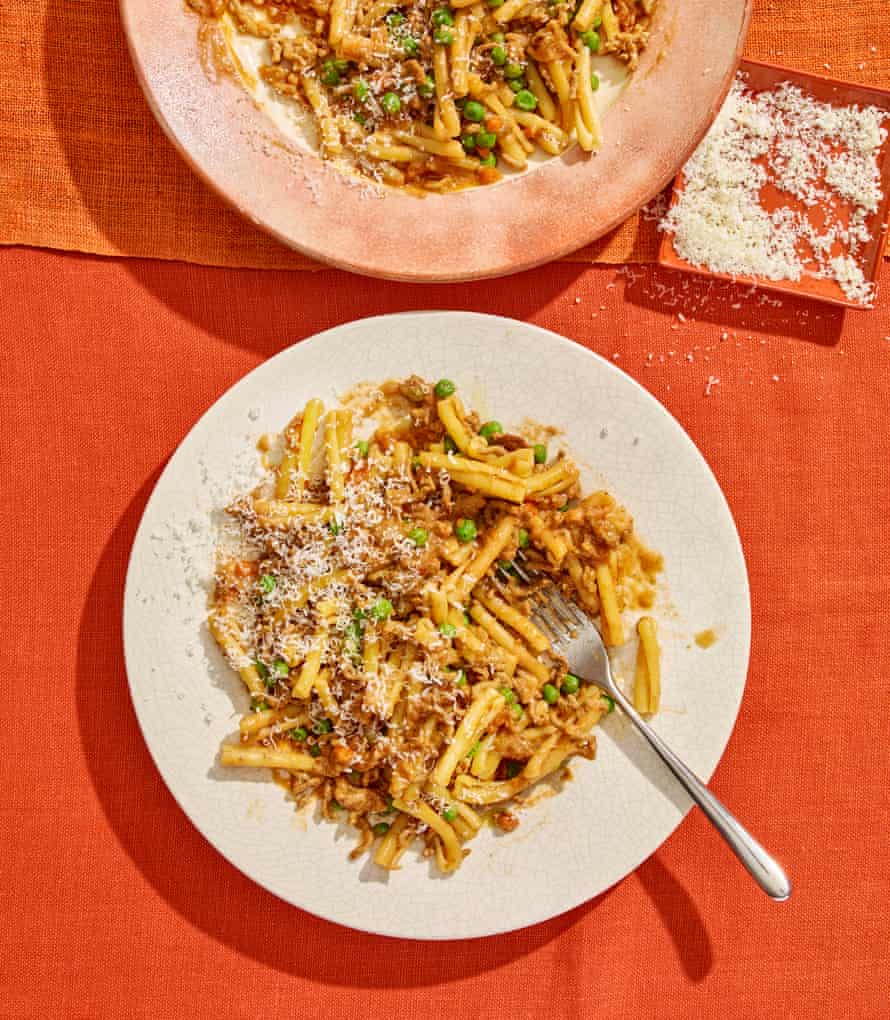
Bolognese sauce, or ragù, features in some shape or form in most UK households, and is usually made with beef mince. In Italy, however, it’s traditionally made with a mixture of pork and veal, though in the south lamb is much more popular, especially in spring. Crespelle, meanwhile, are a lighter alternative to cannelloni. All the various components can be used in other dishes – the tomato sauce with pasta, the bechamel in a gratin, the filling in a toasted sandwich and the pancakes as a pud, say – but combined as they are here, they make a very satisfying vegetarian dish that the whole family can enjoy.
Spinach and ricotta crespelle (pictured above)
There are a few stages involved here, but they’re all pretty straightforward and can be made ahead of time, leaving you just to assemble and bake the dish when the time comes.
Prep 10 min
Cook 1 hr 40 min
Serves 4-6
For the pancakes (to make 12)
100g plain flour
2 eggs
300ml milk
1 tbsp oil
1 pinch salt
Butter, for frying
For the tomato sauce
2 tbsp olive oil
5 garlic cloves, peeled and thinly sliced
1 pinch dried chilli flakes
1 x 400g tin plum tomatoes
1 tsp sugar
Salt and pepper
For the bechamel
50g butter
1 tbsp olive oil
50g flour
500ml whole milk
Grated nutmeg, to taste
50g vegetarian parmesan, grated
For the filling
500g spinach, washed
1 tbsp olive oil
25g butter
1 tbsp marjoram leaves
1 garlic clove, peeled and grated
250g ricotta
1 egg yolk
75g vegetarian parmesan, grated, plus extra to serve
First make the pancakes. Whisk the wet ingredients into the flour to make a thin batter, add a pinch of salt and leave to rest for at least five minutes.
Melt a little butter in a nonstick pan over a medium heat, then pour in a ladle of the batter, tilting the pan so the base is covered evenly. Cook for a couple of minutes, until the bottom of the pancake is set, then flip and cook on the other side for a couple of minutes more. Transfer to a plate and repeat with the remaining batter.
Now for the sauce. Put the oil in a small pan on a low heat, add the garlic and dried chilli and cook until the garlic slices are opaque (and before they go brown). Add the tomatoes and sugar, season generously, then turn up the heat to medium and bring to a simmer. Turn down the heat, leave to cook slowly for at least 30 minutes, then blitz smooth and leave to cool.
Next, the bechamel. Put the butter and olive oil in a pan on a low heat. Once melted, stir in the flour, beating it in with a wooden spoon until the mix is smooth, then cook gently, stirring, for five minutes.
While the roux is cooking, heat up the milk in another pan – don’t let it boil – then stir into the first pan a ladle at a time and beating after each addition, until you have a smooth, thick sauce. Season well, add nutmeg to taste, simmer for five minutes, then stir in the cheese.
Now for the pancake filling. Heat the oil in a large pan, tip in the spinach and cook, stirring, over a high heat, until wilted. Season, tip into a colander set over a bowl. Once the spinach has cooled, squeeze out any excess moisture, then roughly chop.
Melt the butter in a large pan, add the marjoram and garlic, and cook for a minute. Tip in the chopped spinach, braise for a few minutes in the flavoured butter, then tip into a bowl and leave to cool. Once cooled, mix in the ricotta, egg yolk, vegetarian hard cheese and seasonings.
Finally, the assembly and cooking. Heat the oven to 200C (180C fan)/390F/gas 6. Butter a large ovenproof dish in which 12 rolled-up pancakes will fit snugly. Spread half the bechamel in the bottom of the dish and top with half the tomato sauce. Divide the filling between the pancakes, then roll up each one. Arrange the pancakes on top of the tomato sauce, then cover, first with the remaining sauce, and then the bechamel. Sprinkle over the extra cheese, and bake for 15 minutes, until the top is golden.
Pasta with lamb and pea ragu
Italians enrich meat ragu not just with wine, but with milk, too, which turns the sauce creamy. If you like, add some frozen broad beans or jarred artichokes four or five minutes before the end of the cooking time.
Prep 15 min
Cook 1 hr
Serves 6
2 tbsp olive oil
500g lamb mince
Salt and black pepper
1 onion, peeled and finely diced
1 small carrot, trimmed and finely diced
1 stick celery, finely diced
1 leek, trimmed and finely diced
3 garlic cloves, peeled and crushed
1 pinch dried chilli flakes
1 tsp ground fennel seeds
1 anchovy fillet, drained
1 splash white wine
200g tomato passata
250ml chicken stock
250ml full-fat milk
1 tbsp balsamic vinegar
150g frozen peas
Grated parmesan
500g casarecce, fusilli or other dried pasta
Put the oil in a large, deep-sided frying pan over a high heat, then brown the mince. Season well, then transfer to a bowl with a slotted spoon. Tip the finely diced vegetables into the oily pan, cook on a medium heat, stirring often, for about 10 minutes, then stir in the garlic, chilli, fennel and anchovy, and cook for another minute.
Return the lamb to the pan, mix with the veg, then turn up the heat, add the wine and cook until it’s all but evaporated. Add the passata, bring to a simmer and cook for five minutes. Pour in the stock and simmer for another 10 minutes, until the sauce is quite thick; while it’s cooking, break up any lumps of meat so the sauce is smooth.
Add the milk, simmer for 15 or so minutes, until the sauce is thick and creamy, then stir in the vinegar and peas, season again to taste (be generous) and cook for three minutes. The sauce is now ready.
Cook your chosen pasta in lots of salted boiling water according to the packet instructions, until al dente, then drain, reserving a small cup of the cooking water.
Fold the sauce through the pasta, add grated parmesan to taste and season again; if the pasta seems a little dry, add some of the reserved pasta water. Serve with extra grated cheese on the side.



